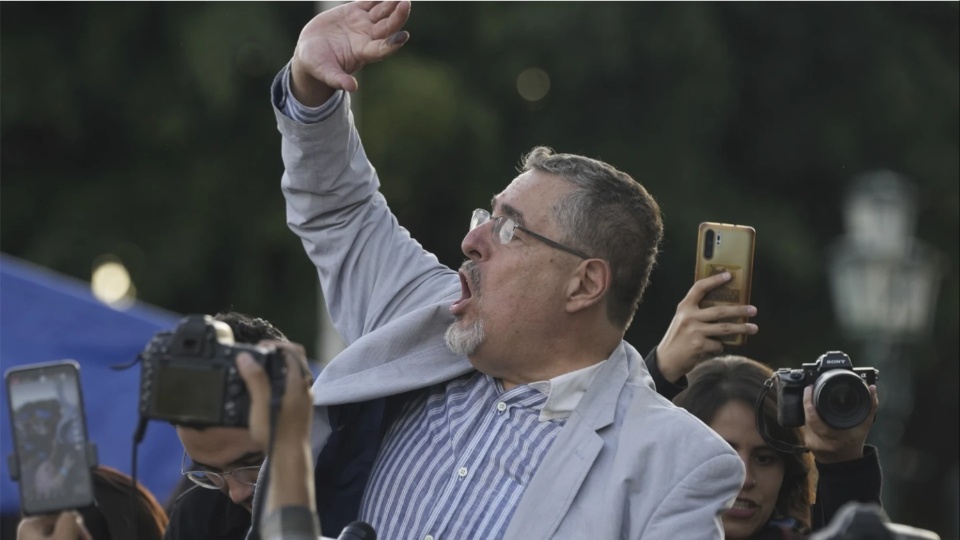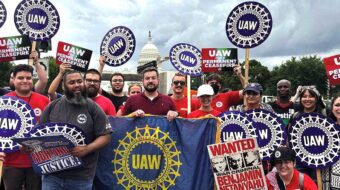
Bernardo Arévalo scored a big surprise in the first-round presidential voting in Guatemala on June 25. Prior to the vote, Arévalo, candidate of the Seed Movement political party, had been lagging badly in opinion polls. But he went on to secure 11.8% of the vote, second place behind the 15.8% tally for Sandra Torres of the right-wing National Unity for Hope Party (UNE). Second-round voting takes place on August 20, possibly.
The Seed Party quadrupled its congressional delegation to become the third largest, with 23 seats. That party was formed in 2015 with the mission of fighting corruption. Critics refer to political forces associated with Guatemala’s last three presidents, including incumbent President Alejandro Giammattei, as the “Pact of the Corrupt.”
Conservative politicians, “together with the evangelical churches,” campaigned vigorously against Arévalo, “presenting him as a leftist extremist.” Unnerved by his unexpected success, those forces took vigorous action.
The UNE and eight other political parties complained. On July 8, Guatemala’s Constitutional Court (CC), backed by the Supreme Judicial Court, ordered the country’s Supreme Electoral Tribunal (TSE) to suspend certification of the results pending a recount.
When it was completed on July 12, the CC authorized the TSE to certify. But Fredy Orellana, a judge with the so-called Seventh Instance Court, then authorized the Special Prosecutor against Corruption to invalidate the “judicial personhood” of the Seed Party, the effect being to prevent the party from competing for votes.
Looking for evidence of alleged voter fraud, agents of various agencies carried out intrusive searches at the Seed Party headquarters and TSE offices.
The TSE, on July 21, announced it was seeking CC protection from the “imminent threat” against democracy and the electoral process posed by various government ministries and particularly the Public Ministry, the state authority in charge of criminal investigations and prosecution.
Almost simultaneously, the CC reiterated that the Seed Party was provisionally protected and that the TSE must allow it to compete in the elections on Aug. 20. Even so, “harassing, intimidating, pressuring, and blocking of the electoral process” continued.
Condemning the shenanigans were the Catholic Church, social movements, and even business sectors. Electoral observers from the European Union weighed in, as did the Organization of American States and its Inter-American Commission on Human Rights. The OAS generally aligns with U.S. purposes. Indeed, Brian Nichols of the U.S. State Department Tweeted that the U.S. was looking “forward to the Aug. 20 vote on the announced top two presidential candidates.”
Congresspersons Raúl Grijalva, Norma Torres, James McGovern, and Eleonor Holmes Norton often oppose State Department positions on Latin America, but on July 21, they wrote to Secretary of State Antony Blinken, urging him to pressure Guatemala’s government to allow second-round voting to proceed.
By implicitly supporting Bernardo Arévalo, the U.S. government seems to have reversed course to the extent that it was now speaking up for progressive political leadership─far from its usual practice as regards Latin America. Given its long immersion in Guatemalan affairs, however, U.S. actions there probably are coherent, if not always just or legal.
The United States has recently applied economic sanctions to Guatemalans accused of political corruption. The Defense Department now and then supplies Guatemala’s security forces with military equipment. In October 2022, military vehicles worth $4.4 million were donated, supposedly for use against drug trafficking and for control of migrants. Over many years, the U.S. and Guatemalan militaries have carried out joint exercises.
Really, U.S. intervention is part of Guatemala’s DNA. Cuban investigator Hedelberto López Blanch states that:
Before World War II, “Guatemala was in the hands of a few big landowners and U.S. companies… Workers were reduced to conditions of semi-slavery … The government of Jacobo Arbenz tried to change this political, economic, and social system, but in June 1954 he was overthrown by the intervention of the CIA and large U.S. landowning companies.”
For 34 years ending in 1996, the U.S. government─the CIA in particular─was a constant presence. This was a time of rural insurgency, war against Indigenous peoples, and 200,000 deaths. Analyst Marc Weisbrot explained in 1999:
“[O]ur government had extensive and up-to-date knowledge of massacres and other atrocities, while they maintained a close working relationship with the Guatemalan military at all levels. The United States supplied weapons, training, and other aid to the military…. Through some of the worst periods of killings, our government provided crucial political support.”
Seed Party candidate Bernardo Arévalo has coexisted with U.S. interference for a lifetime. He was abroad during his youth after his father, President Juan José Arévalo, went into exile due to the U.S.-assisted 1954 coup. He served Guatemala’s government as a diplomat and mainstay in the Ministry of Foreign Affairs in the closing years of the civil war. He later taught in the United States and worked at the federally funded United States Institute of Peace.
That the Seed Movement represents a new kind of right-wing politics for Guatemala, as suggested by commentator Félix Alvarado, may appeal to the U.S. government. In power, Arévalo supposedly would embrace business competition, be less corrupt, and not be beholden to rabid anti-communists and evangelicals.
In a recent interview, Arévalo spoke about governing: to deal with corruption, one needs “a process of convergence of social forces” and “recuperation of institutions.” As regards poverty: “The government can’t help everyone but we can begin to create policies for the medium and long term.” As regards “backwardness, discrimination, and racism … we are setting the foundation for the beginning of a process in which institutions begin to function and serve the common good.”
For the U.S. government, Arévalo’s evident deliberation, caution, and limited expectations identify him as an entirely safe would-be Guatemalan president. But a time of testing, a social explosion, is at hand. Maybe for U.S. purposes, Arévalo would be the right president to ward it off or deal with it.
Numbers speak: 260, number of millionaires; $95 billion GDP, highest in Central America; 47%, rate of undernutrition among children under the age of five (6th highest in the world); 61.6 %, rate of persons living in multidimensional poverty. Also, 2.5% of farms use 65% of the agricultural land, 45% of Guatemalans are Indigenous, 79% of the Indigenous live in poverty, 80% of rural people are Indigenous, and Guatemala’s human development index ranks 127th out of 189 counties.
In the recent first-round voting, 17% of the ballots were left blank, and 40% of eligible voters abstained. Non-participation surely points to social and political exclusion─of Guatemala’s Indigenous people in particular. They don’t figure into current media reports on election difficulties, but they are the fuse for a potential social explosion.
The reflections of Silvel Elías appearing on March 1, 2023, on debatesindigenas.org make this point:
“The colonialist obsession of the Guatemalan State is evident in … setbacks in human rights and indigenous rights, denial of indigenous demands; violent repression … the granting of extractive licenses on ancestral territories, and practices of structural racism and social and political exclusion.
“Inequality continues to deepen … There are no laws, public policies, or targeted programs that serve indigenous peoples.
“Although indigenous Guatemalans represent 45 percent of the population, their representation in the Congress has never exceeded 10 percent. Indigenous people there don’t represent indigenous interests, but rather those of the traditional political parties that nominate them.”
The U.S. government probably takes the region’s history into consideration as it deals with elections in Guatemala. The mix of extreme poverty, Indigenous uprising, and rebellion in Bolivia and Peru is a warning.
We hope you appreciated this article. At People’s World, we believe news and information should be free and accessible to all, but we need your help. Our journalism is free of corporate influence and paywalls because we are totally reader-supported. Only you, our readers and supporters, make this possible. If you enjoy reading People’s World and the stories we bring you, please support our work by donating or becoming a monthly sustainer today. Thank you!












Comments